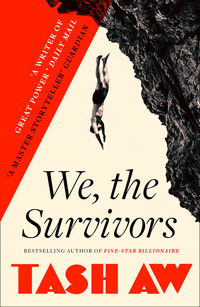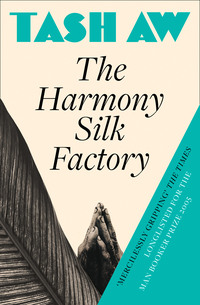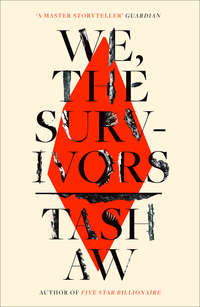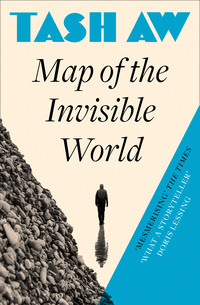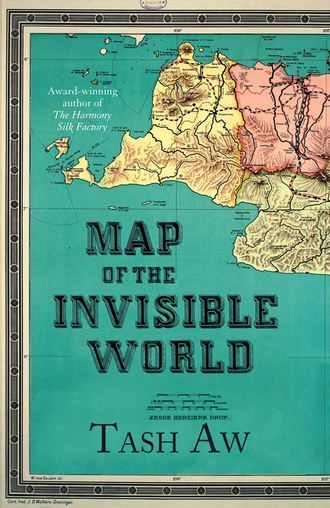
Полная версия
Map of the Invisible World
‘…and of course the unknown story of Muslim seafarers.’
‘Well,’ Margaret said, ‘why don’t you just go ahead and do it?’
Instantly Din fell pensive and silent as he played with the pool of curry in which he had drowned his rice. ‘No one will fund me. I asked everyone in Holland and they all said no. They think it’s about politics. And here, well, the President talks about grand projects, but we all know there’s never going to be any money. Not for people like me.’
Margaret did not answer. She looked at his slim sloping shoulders as he toyed aimlessly with his food. He had a way of making the morsels on his plate seem meagre and almost inedible. There was nothing she could do for him, she thought; perhaps she ought to give up. Perhaps she ought to have given up on this country a long time ago. It was still early in the evening, but she was already tired.
‘Let’s go for a drink,’ she said. She would shake off this lethargy, she knew she could.
Din’s face twisted into a half-frown. ‘Um, no thanks actually. I’m quite tired today. Maybe I’ll just go home.’
Margaret stacked the empty dishes on top of each other to signify the end of the meal. ‘Just come for one quick drink. You’ll enjoy it from an anthropological point of view if nothing else. Come on.’ She waved a few notes at the vendor.
‘Really, it’s very kind of you, but I don’t think I’d be comfortable at the Hotel Java.’
‘Rubbish. You’ll have a ball. I told you, I never take no for an answer.’ She smiled sweetly and knew that he would come: when she decided she wanted something, she was never refused.
As they got up to leave Margaret turned back to look one last time at the boy with the Berkeley T-shirt, but he was no longer at the table. She looked around at the stalls, expecting to see him half-hidden behind a pillar or milling in the crowds, but she could see nothing. He had been there at the table half a minute ago and now he was gone.
‘Well, what fun this is going to be,’ Margaret said brightly.
Built in 1962 to celebrate the Asian Games, the Hotel Java sits on the edge of a sweeping roundabout in an area that might be called downtown if this city had an uptown. Like so many of the brutalist concrete buildings springing up around Jakarta, the hotel’s angular lines and slightly industrial appearance were meant to remind the beholder of both Le Corbusier and the Bauhaus aesthetic: international yet functional. The roundabout in front of it is in fact a shallow, perfectly circular pool of water from which jets of water spurt majestically at a young peasant couple standing on a tall narrow plinth. The hotel and the fountain are just two of the many projects designed to impress visitors to Jakarta with the city’s dynamism, and were commissioned by Sukarno himself (‘the President’s majestic erections,’ Margaret called them). Not more than two years had passed and already the toilets in the hotel were unpleasant; some of the bulbs in the grand chandelier in the lobby had blown and hadn’t been replaced; the carpets were scarred by cigarette burns and the table linen dyed with old wine stains.
‘Looks as if the President’s erections are faltering,’ Margaret said as she looked at the chipped edge of the bar. She had had two martinis already. The first had gone straight to her head and the second had slipped down all too easily. She was trying to make the third one last, but it was difficult; she felt a flush in her cheeks and she wanted to drink quickly. She was already quite light-headed, she knew, but she felt strong again.
Din stood with his elbows on the bar, facing away from the room. He stared at the rows of bottles arranged on the mirrored wall facing him, as if examining every single label. He would take only a Coke, no matter how hard Margaret tried to persuade him otherwise. He wouldn’t even drink a Bintang. She was usually sensitive enough not to transgress cultural boundaries – but Din was different. Yes, he was Muslim, but he had lived for three years in Europe, and was not just another unsophisticated small-town Indonesian. If they both had a drink, she thought, the alcohol might help break down the boundaries that remained between them and they would be friends.
There was music, a band and a pretty Filipina in a tight white dress singing ‘Solamente Una Vez’ in bright, clear notes, rolling her r’s impeccably while shaking a pair of brightly coloured maracas to accompany the Cuban drums. The bar was not full but it was already very noisy, the air smoky and filled with men’s voices. There were a lot of men here and not many women; not many locals either. The only Indonesians present seemed to be women, and nearly all were prostitutes.
‘Here you have the Occident’s finest at play,’ Margaret said. ‘See those two guys? Pulitzer winners a few years back. They’re supposed to be reporting on one of the most urgent political situations in the world and what do they do? Chase after girls they can’t get at home. And that idiot over there, yes, that one canoodling with the Batak girl, he’s meant to be administering aid for the World Bank, but it doesn’t look as if he’s capable of administering anything but a strawberry daiquiri.’
‘Do you know everyone here?’ Din asked.
‘I recognise a few faces.’
A big pink-faced man with sandy hair and freckles came through the doors and headed straight for Margaret. He had a young local girl with him, tall for a Javanese and quite fair. ‘Margaret, how are you? Haven’t seen you in ages – not since last year’s fourth of July party at the Lazarskys’. Who’s the boyfriend?’
‘He’s not my boyfriend, he’s my colleague at the university.’ She was about to introduce Din when she noticed he had slipped away, heading for the toilet. ‘How’s the girlfriend, Bill?’
‘Fine,’ he said, putting a fleshy arm across his companion’s shoulders, ‘just fine. Her name’s Susanti, but I just call her Sue.’
‘Been together long?’
‘Guess so. Longest since I got here, at any rate,’ he laughed, patting his pockets in search of his cigarettes.
‘Wow. Two weeks? Congratulations.’
He smiled for a moment then broke into an over-hearty laugh. ‘You just kill me. You’re still just so…Margaret.’
‘See you around, Bill.’
A table and two chairs became free at the back of the room, in a shadowy corner where the light bulbs had gone out. Margaret went over and sat down, making a cursory attempt to fiddle with the bulbs. She preferred everything to be bathed in light, preferably sunlight. It was not that she was afraid of the dark: she just did not like it, for it frustrated her not to be able to make things out clearly. The windows looked out on to narrow streets away from the noise and great rush of traffic of the grand roundabout. There were not so many people here, just a few of the embassy drivers waiting for their bosses to finish dinner. They milled about in small groups, smoking and exchanging gossip. Most of them were smartly dressed in creased trousers and khaki shirts, but there were a number of other locals who were more difficult to place: bodyguards trying to look casual, perhaps, or local journalists bribing the drivers for information. Margaret tried to discern the differences between them. She was good at this, good at spotting what lay behind this Asian mask of inscrutability. She had learnt to do this in the jungle, with tribes who wore real masks and whose body language was indecipherable to outsiders, and she applied it with great success everywhere in Indonesia, even in this city of three million people. In America and Europe she had not been quite so successful; her antennae did not pick up the right signals with other occidentals. She had not really even been able to understand her parents.
‘So who was your friend earlier?’ Din said, joining her at the table.
‘What friend?’
‘That American man.’
‘Bill Schneider, you mean? He’s not a friend. He works at the Embassy. Not exactly sure what he does – something to do with finance. Well, OK, I think he arranges all the bribes from our wonderful country to your wonderful country to build all your wonderful projects.’
‘Like this hotel?’
‘Probably Although I think this hotel might have been funded with Japanese baksheesh – not that it makes any difference. Bill and his lot certainly have their fingers in the pie now. I tell you, that man is everywhere.’
They watched him drinking a tall glass of beer with a group of friends. He stubbed out his cigarette with clumsy little jabs and punched people on the shoulder to emphasise his jokes. He laughed a lot, always loudly. From across the room they could only catch snippets of what he was saying. ‘…last year the Yankees got unlucky, this year they’re gonna step up…I’m tellin’ ya, you can’t lose with a name like Yogi Berra…’
‘He can at least speak Indonesian,’ Margaret said, ‘and Russian too, which is a big help in this town.’
Din nodded. ‘His girlfriend is very pretty.’
‘He’s got bags of that je ne sais quoi that girls find so irresistible: US dollars. Do you want another Coke?’
Din shook his head. ‘Thank you, but I have to go. It’s a long way home for me.’
‘I think I’ll head home too. I’m sorry the evening was a bit dull.’
They walked through the grand lobby where smart-looking men in bush jackets and expensive women in shimmering dresses turned to look at them. They stood at the entrance for a moment or two, unsure of how to bid each other goodbye. A kiss? Out of the question. A hug? Still too intimate. Handshake? Too formal.
‘See you tomorrow, I guess,’ Margaret said, holding up her hand in a stilted wave.
‘Yes,’ he said, and a smile flashed across his face, not the infuriating unreadable one, but something thinner and tired. He looked curiously frail as he walked briskly down the curving driveway, past the long row of shiny black limousines, before disappearing into the stream of traffic. The lights in this part of the city made the sky look pale and hazy, even at night.
‘Margaret,’ someone called out. It was Bill Schneider again. He did not have his girl with him this time. ‘I saw you leave and I thought, “She can’t be leaving us so quickly!”’
‘Well, I am leaving, Bill.’
‘Wait.’ When he smiled he showed off the top row of his perfect teeth. ‘You remember what we talked about last time we met…’
Margaret looked him in the eye then looked away. ‘Yes.’
‘And…?’
‘And what?’
‘Well,’ he paused. ‘We need to know what you…think.’
She did not answer. A steady stream of limousines drew up before them; the revving of the engines and the exhaust fumes made her feel sick, and the whistling of the doormen rang sharply in her ears and made her incipient headache grow worse. She wanted to go home.
He stood watching her, not saying anything. Margaret felt he was prepared to stay there all night, waiting for her to answer, but in the end he said, ‘I’m sorry. This is not a good place to speak. You sure you won’t come back inside for one more beer? No, you’re tired, of course. Look, come by and see me in my office. Soon.’ He handed her a folded-up newspaper. She saw the same smiling badminton player she had noticed earlier in the day, one half of his face disappearing into a crease. Bill leant over to kiss her on the cheek. ‘Come soon, Margaret.’
‘Taxi, madam?’ asked the doorman.
‘No thanks, I’ll walk for a while.’ She went down to the road and stood watching the swirling traffic before her, assailed by the pleading cries of the child beggars and the shrill calls of the boys and girls lined up on the other side of the road. It hurt Margaret to look at them, so she turned away, trying to pretend that the noise was something mechanical and inhuman. The city had never seemed so enormous, so overwhelming, so chaotic, and its enormous overwhelming chaos was growing worse every day. Not wishing to walk any longer, she hailed a taxi that stank of clove smoke; She unfolded the newspaper and looked at the front page. Bill’s handwriting – a surprisingly elegant cursive – read: Page 5: PS Great to see you again. B
She flicked through the pages. More protests in Europe against the imprisonment of Mandela. Sukarno condemns Gulf of Tonkin Resolution. Abebe Bikila promises gold for Africa. Brezhnev to provide more aid for Indonesia. Drug use in Malaysia reaching epidemic proportions; Britain offers no help. Communists arrested in outlying islands. It all looked familiar to her – surely she had read it all this morning?
She looked again at page 5. Below the article on communist arrests was a small picture. In the dim light at the back of the taxi it was difficult to make out the already blurred photograph of twenty or so men in a police cell. But there was one face, paler than the others: a European.
4
In 1841 the Nan Sing, a Chinese vessel sailing under the Dutch flag, set sail from Canton bound for Batavia laden with a cargo of porcelain, silk and tea. Caught in unseasonally bad weather just south of Cape Varella, it began to move south-eastwards, drifting for many days until, lured by powerful currents, it crashed on the notorious reefs off the rocky shores of Nusa Perdo. Exercising his ancient right of looting shipwrecks, the Sultan immediately ordered his fleet of little boats to recover the precious flotsam from the wreck of the Nan Sing. Enraged by this transgression, the Dutch authorities in Batavia demanded the return of the cargo and ordered the Sultan to submit to Dutch rule. When this was predictably refused, several skirmishes took place, escalating into a stand-off that lasted two days. There followed a further fifty years of shipwrecks, looting and half-hearted attempts by the Dutch army to bring the island under its control. No great energy was expended in the subjugation of Perdo because the island had neither spices nor sandalwood. Covered in scrubby bushes and dominated by a dead volcano, this unobtrusive island virtually disappeared in the constellation of more attractive islands around it, until, late in the century, the discovery of Kayuputih trees and rumours of rich gold deposits brought the white man back to these shores, and this time they did not leave. The Sultan died by his own hand and the island came under Dutch rule.
No one really knows how the island got its curious name, which does not seem consistent with the rhythms of the (now virtually dead) local dialect. Writing about Muslim sects in the eastern archipelago in the pre-war Revue des Études Islamiques, a French scholar called Gaston Bosquet suggests that the name of this island is a bastardisation of ‘pieds d’or’, a reference to the fascination held by early Western visitors for the shoes of gold cloth worn by the princes of the royal household in the seventeenth century, and to the idea that these explorers might have been walking on fields of gold. Given the relative poverty of this island, however, such explanations seem highly implausible (rumours of gold reserves turned out to be a myth). No more likely – though a touch more romantic – is the idea that members of a Portuguese reconnaissance expedition in the early sixteenth century foundered on the rocky coastline of the island, as so many were to do in the centuries that followed. Marooned hundreds of miles from the shipping channels between Malacca and China, they called this place the Lost Island, Nusa Perdo – a name that continues today. This might also explain why, in town, there are three local merchants whose surnames are Texeira, De Souza and Menezes, even though they look thoroughly Indonesian.
These were the stories that Adam loved above all others – the unofficial history of Perdo; he clung to them dearly, afraid they would desert him. He knew exactly why he found them so comforting – they gave him a reason to be different: maybe he, too, had foreign blood in him. And this was why he did not look like the other children on the island, why they hated him.
He often wished that he had the coarse curly hair of the local boys, as well as their sturdy square faces that made them look, well, rudimentary, more suited to the sharp changes of weather on the island. Sometimes, if he stayed out in the sun for too long, the skin on his forearms and knees would begin to smart, as if rubbed with fine sand, and by the end of the day it would feel hot and taut, properly burnt by the sun, just like Karl’s – a foreigner’s skin. On those occasions he wished that he had the other children’s darker, thicker skin that turned to leather by the time they were teenagers, shielding them from the elements. He wished he did not have his straight hair and brittle jawline and fragile cheekbones; he wished he did not stand out quite so much.
For one bucolic year after he moved into his new home, he did not have to worry about other children – or, indeed, about anything else. Much later in his life he would remember that first year with a mixture of nostalgia and regret, and he would experience that odd sensation of sorrow and yearning said to be a trait peculiar to people of the south-east, even though he himself was not genetically native to the region. But the truth was that life during this time was simple, blissful and untroubled, in a way that can only happen when two people are desperate to achieve happiness.
Their days were idyllic and filled with all the things that fathers and sons dream of sharing. They made kites in the shape of birds that sometimes swept effortlessly into the sky but more often crash-landed after the briefest of flights, much to Adam’s and Karl’s amusement; they played takraw in the yard, Adam’s plump legs proving surprisingly adept at juggling the hard rattan ball, Karl less so because of his one weak leg; they hollowed out lengths of driftwood and collected lengkeng seeds to play congkak, a game which Karl explained had been brought to these islands by Arab sea traders many hundreds of years ago; they found an old biscuit tin amongst Karl’s things that contained chess pieces, and drew a chalk chessboard on the floor of the veranda that had to be re-sketched every time the rains swept in and washed it away.
It was a Spartan happiness, it is true. Sometimes, Karl often told him, it is better not to own things, especially precious things, because they will be lost or taken away; things cannot last beyond your lifetime. Karl did not spend any money on toys, for example, or anything he deemed to be ephemeral or trivial. Once or twice, Adam had paused in front of the glass cabinets at the Chinese store in town, admiring the brightly coloured motorcars and plastic water pistols. ‘No one here can afford these toys,’ Karl had said, gesturing in the vague direction of the villages on the coast, ‘and yet they’re quite happy. We don’t need these things either – we’re just like everyone else.’
And so they pursued simpler pleasures. Adam learnt to wade into the shallows and, when the sea was calm, he’d paddle out over the reefs with Karl. He would float along quite calmly for a while but then he would be panicked by the enormity of the ocean, the endlessness of its possibilities, and he would start to flail around, desperate to regain the sureness of the shore, until Karl came over and held his hand. His previous world now seemed empty and colourless, but in this world there were kaleidoscopic fish, purple sea urchins and pulsating starfish; and beyond the coral there was the promise of shipwrecks, their silent corpses filled with treasure from a lost time. Later, Karl would tell him about each of the wrecks: one of them had been shipping opium to China, another had been decommissioned from the British Navy; the biggest one contained hundreds of bottles of precious wine from Oporto and Madeira, still drinkable. In this way Adam learned the history of Perdo; about the Opium wars, Catholicism and the destructive power of religion, and the unjust conquering of Asia by Europe.
This is how Adam believed his new world would begin and end – in this place where he was safe from danger but connected to the possibilities of the world. It was then, however, that Karl began to talk about school.
‘Can’t I just stay at home and learn things from you, pak?’ cried Adam, trying to stem his growing unease. ‘What else do I need to learn?’
‘What you need to learn isn’t contained in textbooks. You need to learn how to live with other people your age – how to be like everyone else. You mustn’t become too privileged.’
But Adam already knew that he was not like everyone else. That was why he was here in the first place, living on this island that was not his real home, with a father who did not look at all like him.
Other children. The very sound of the words made him feel sick. For nearly a year he had had little contact with other children. He had seen them in town whenever he and Karl went for supplies, but he avoided their cold hard stares and clung to Karl’s side, never looking directly at them. He saw them crouching by the roadside, blinking the dust from their eyes as he swept by in the car. And further along the beach he sometimes saw them splashing in the shallows in the late afternoon when the sea was flat, the shadows of the trees reaching across the sand towards the water’s edge. Their faraway cries were shrill and threatening.
* * *
‘Don’t worry, you’re just like the other boys,’ Karl said as he took Adam to school that first day. He spoke in a calm voice, yet Adam knew that Karl himself was not convinced by what he was saying. ‘You’ll enjoy being with compatriots your age. If ever you feel scared, tell yourself, ‘I’m just like everyone else here.’’
The school was a one-room shack on the edge of town, a squat concrete block with a roof of corrugated iron. Adam loathed it from the beginning; its very appearance made him feel sick, and spots of colour appeared in his vision, as if he was going to faint. (I’m just like everyone else here.) There were about eighteen or twenty children crammed into the small classroom, all boys, save for one girl whose roughly cropped hair made her look like a boy. One side of her face was obscured by a birth-mark, a purple-red cloud that stretched from her temple to her jawbone. Adam had to stare closely before deciding that she was indeed a girl; she stuck out her tongue and threw a scrunched-up piece of paper at him. The other boys gathered round him and examined the contents of his new canvas satchel: an exercise book with buff-coloured covers, a pocket atlas and a new box of coloured pencils. His classmates tore the pages from his books and folded them into paper airplanes that they launched into the air with sharp spearing motions. Adam watched as bits of the atlas glided past him: the pink-and-green of the United States floated dreamily in circles until it stubbed its nose on the blackboard and fell abruptly to the ground; the whiteness of the Canadian tundra swept out of the window in an arc, into the dusty sunlight; and the silent mass of the Pacific Ocean that Adam loved so much, dotted with islands (Fiji? Tahiti?) lay on the cracked cement floor, waiting to be trampled upon.
At the end of that first day he did not have the strength to cycle the entire journey home; he pushed his bicycle along the final sandy stretch, too tired even to cry. When he reached the house he let his bicycle fall to the ground; he sat on the steps to the house watching the pedals spin lazily to a stop. There were sea-eagles hovering against the powder-blue sky, barely trembling in the wind. Karl sat with him and put his arm round his shoulders. He shook his head and said, ‘It’s a privilege, you know.’
‘What is?’
‘Education. You saw those kids at school? What kind of families do you think they come from?’
Horrible ones, Adam wanted to say. Filthy, mean, horrible ones.
‘Poor ones. Farmers or fishermen who can’t read or write, and yet everyone has had to pay to get into that school. They take a small packet of money or a carton of cigarettes to the education officer and beg him to put their child’s name on the school list, and if they don’t have cash they take a goat or some chickens or sacks of rice. There isn’t space for everyone, so the kids whose parents pay the most get in. I had to do the same – I paid the most because I’m, well, they look at me and their minds are made up.’





